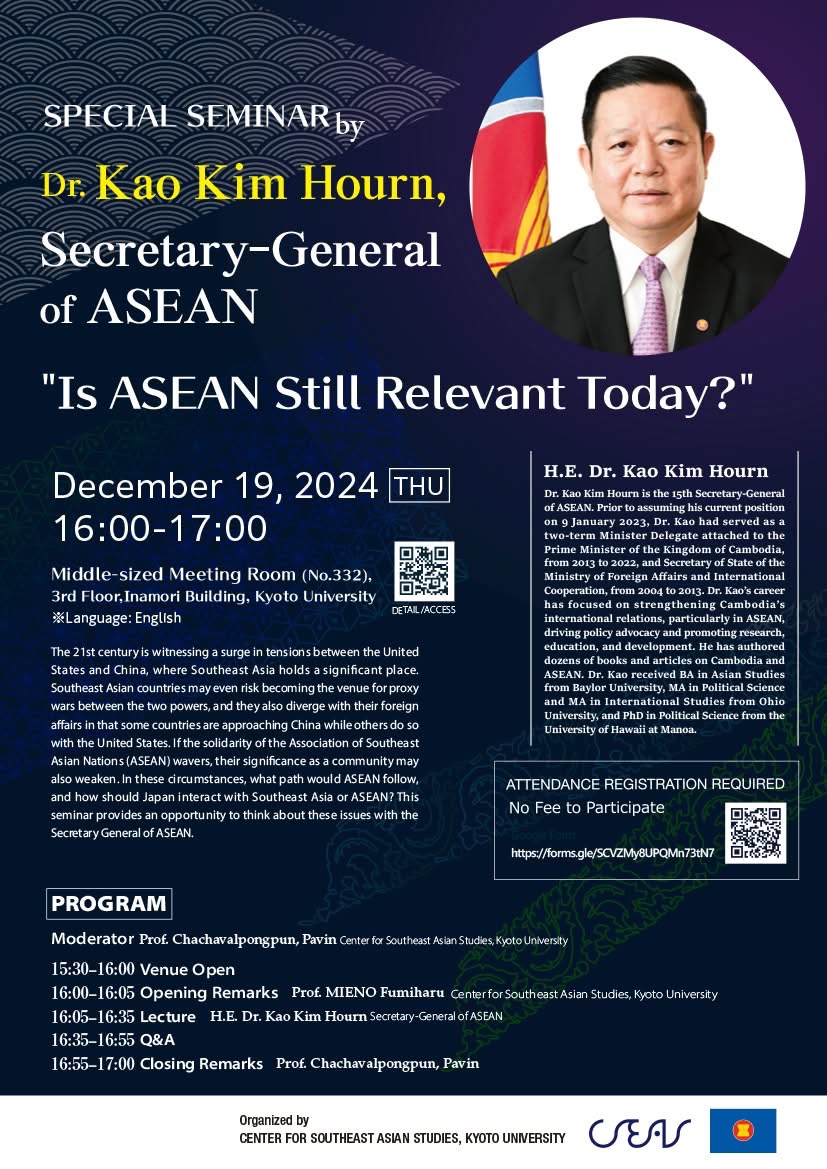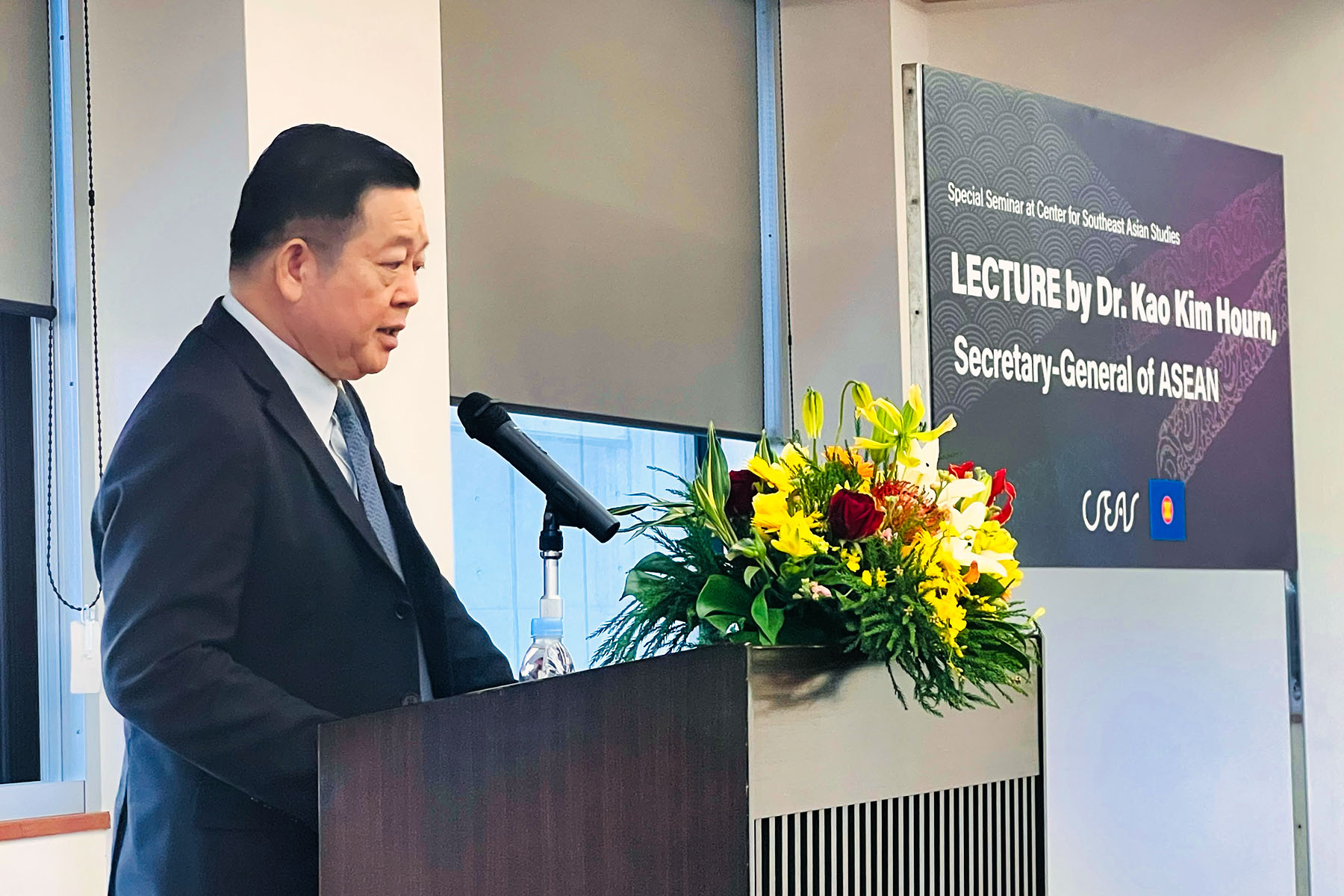
On behalf of the Center for Southeast Asian Studies (CSEAS) and as the editor of the Kyoto Review of Southeast Asia, Pavin Chachavalpongpun, professor at CSEAS, interviewed Dr. Kao Kim Hourn, ASEAN’s Secretary-General, on the topic, “Is ASEAN Still Relevant?” The interview was conducted on 19 December 2024 during which time Dr. Kao was invited to give a lecture on the said topic at CSEAS.
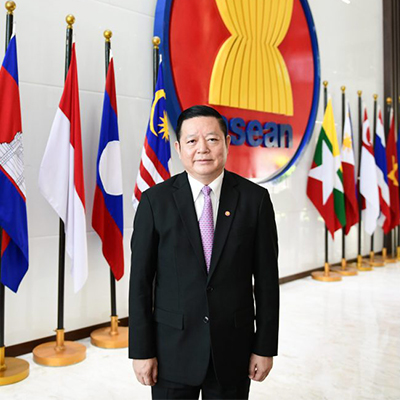
Below is the transcript of the interview from 19th December, 2024 with questions asked by Pavin Chachavalpongpun –
Now, of course, there are certain issues that are easier to deal with and those that are more challenging. For example, it is not easy to get an ASEAN position on Gaza. But you may remember that when our Leaders had their first summit with the Gulf Cooperation Council (GCC), we had the opportunity to have a statement with the GCC on Gaza, which reflected the position and central role of ASEAN. The same thing is on the Korean Peninsula. You know that ASEAN had issued a number of statements on difficult issues such as on Ukraine and Gaza. These were not easy issues, yet we had been able to reach a consensus. This reflects ASEAN Centrality, something which our external partners have expressed support, including by the members of the QUAD and AUKUS.
On Myanmar, this is a very important issue. ASEAN’s Five-Point Consensus which called for an immediate cessation of violence, inclusive national political dialogue, and humanitarian assistance, once again, echoed the ASEAN consensus. Stakeholders believed that ASEAN should play a role in resolving the Myanmar issue and we think that it is important. This is why the ASEAN Leaders issued the Five Point Consensus.
Going back to your question, whether Centrality is required to address the challenges that we have, I think it is. When we talk about this central role, we need to have a consensus amidst divergence. ASEAN has long exercised its central role in managing different issues, from the issue of the Southeast Asia Nuclear-Weapon-Free Zone (SEANWFZ) Treaty, to the ASEAN Outlook on the Indo-Pacific (AOIP). Despite the fact that there are many Indo-Pacific strategies, our partners came out to support the AOIP through the issuance of joint statements with ASEAN. Support for the AOIP is not just a conceptual idea or statement. We have moved towards concrete, practical areas of cooperation, particularly in the four priority areas, from connectivity to SDGs, from maritime cooperation to economic cooperation and other areas.
Some of our partners have asked whether ASEAN has strategic independence. The answer is yes. We have strategic independence.
As for the ASEAN Community Vision 2045, the Vision and the new four strategic plans are expected to be ready for adoption by the ASEAN Leaders during the Malaysia’s chairmanship. This is a vision which carries a powerful message that ASEAN is having its own pathway, roadmap and way forward. And it will continue to build its own community for the peoples of ASEAN. It is a very clear vision and it is important for us to project a very positive, forward-looking strategic vision. This is the first time in our history that we are drawing up a 20-year vision. Initially, people said that maybe it was too long. But I think at the end of the day, we agreed that this was the best way forward for us.
We have been very transparent, very open and inclusive. We cooperate with our partners and friends. Come and work with us. We wish to invite them to work with us. We are looking into the future in terms of how we want to engage with all the great/major powers in this region and around the world.
The other issue that is very important is the TAC, signed in 1976. We have been working together for 48 years with our external parties. Beyond ASEAN, we have countries that are now subscribing to the norms and values enshrined in the TAC. If you look at all the countries that have acceded to TAC now, they actually cover all the continents and regions of the world.
Dr. Kao: ASEAN Identity is an issue that is really important forASEAN. In the ASEAN Charter, we talk about building an ASEAN that is people-centred and people-oriented community. We refer quite often to the peoples of ASEAN. This is not only reflected in the ASEAN Charter but also in many other key documents of ASEAN. Making the region belong to the people means making sure that they feel they are part of ASEAN. ASEAN embraces and respects diversity Yet, we also have to promote our common identity, or the commonality of ASEAN members and what we do together as a regional grouping.
We have the ASEAN anthem, being played more often than before, especially before the start of official functions. It was composed just right after the launch of the ASEAN Chapter. Its composition was actually opened to competition and the Thai group won with beautiful lyrics and a very powerful and clear message. Beautiful language. It is about the people of ASEAN. I hope this practice of playing the ASEAN anthem will continue.
When we receive the letter of credence from ambassadors from partners of ASEAN, we also play the ASEAN anthem during our official ceremony. There are now 106 countries which have their respective ambassadors accredited to ASEAN.
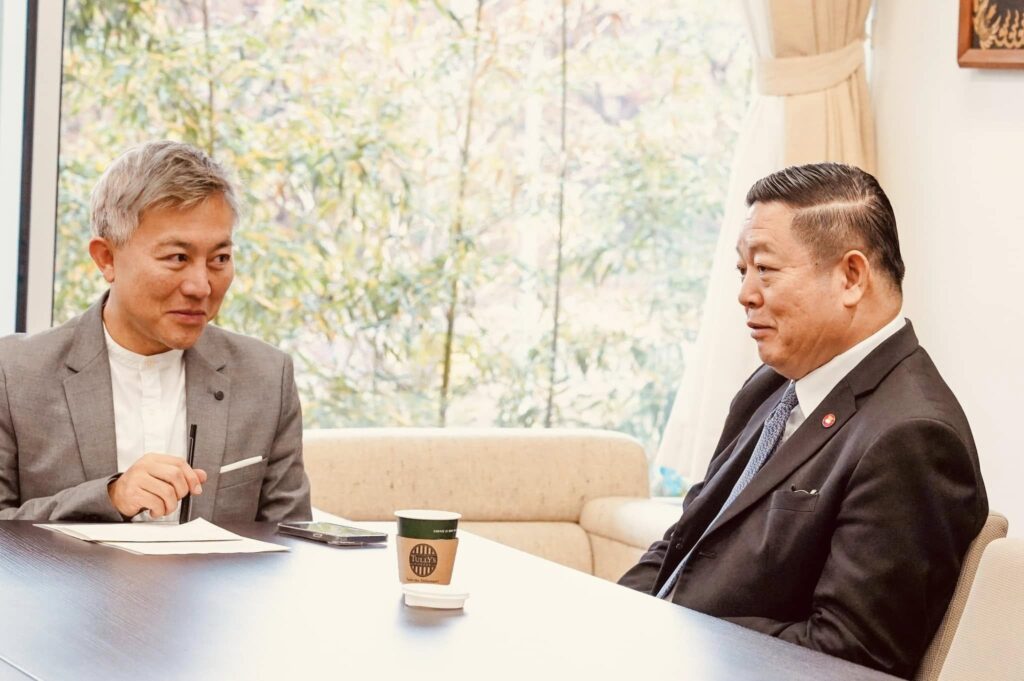
Back to the topic of ASEAN Identity, we have done a lot of work in this area, but we still have a long way to go. What we need to do is to make sure we are doing this for the benefit of the peoples of ASEAN. As a region, we know that if we go separately as ten nations (soon to be 11), we cannot attract all the foreign investments, compared to when we do it collectively. Last year alone, ASEAN attracted USD 228.9 billion foreign investment, second only to the U.S. Among the developing economies, ASEAN is number one. We are working to become a single market and production base, as stipulated in the ASEAN Charter. We have to convey this to the people of ASEAN, the importance of working collectively to attract investments. With investment, we can create jobs for the people. Second, people in ASEAN can travel without visa in the ASEAN zone. While we do not have the equivalent of Europe’s Schengen visa, ASEAN travellers could just book flights, and travel. So, this is the mobility of the people. ASEAN’s intra-tourism is growing. I am saying this with the ASEAN spirit of cooperation. Beyond all of these, there are many other projects, activities, and initiatives to promote the ASEAN identity.
But certainly, we need to do a lot more. We are still ten separate nations. We need to promote our ASEAN Identity more. We have other things such as the ASEAN lanes at the airports. To promote visibility of ASEAN, we have the ASEAN flag displayed at public buildings and at embassies of ASEAN Member States around the world. We also now have the ASEAN Committees in Third Countries (ACTCs) to help promote ASEAN awareness. Here in Japan, we have the ASEAN Committee in Tokyo which is doing a lot of work to promote ASEAN’s visibility and reach out to citizens of the host country.
We also need to raise an awareness of ASEAN and promote its identity around the world. We have ASEAN Centres, such as in Tokyo, Seoul, Beijing, and Washington DC. Just last month, we established a new one in Canberra, Australia. So, I think this is coming up quite well. For example, in Japan, we have 10 ASEAN members’ embassies which promote a lot of activities. In China, the ASEAN activities are significant because there are more programs and more activities. This can be viewed in part as an effort to raise an awareness. We go beyond the people-to-people linkages, to cover the business community, and in all areas, from trade and investment to tourism, culture, and education.
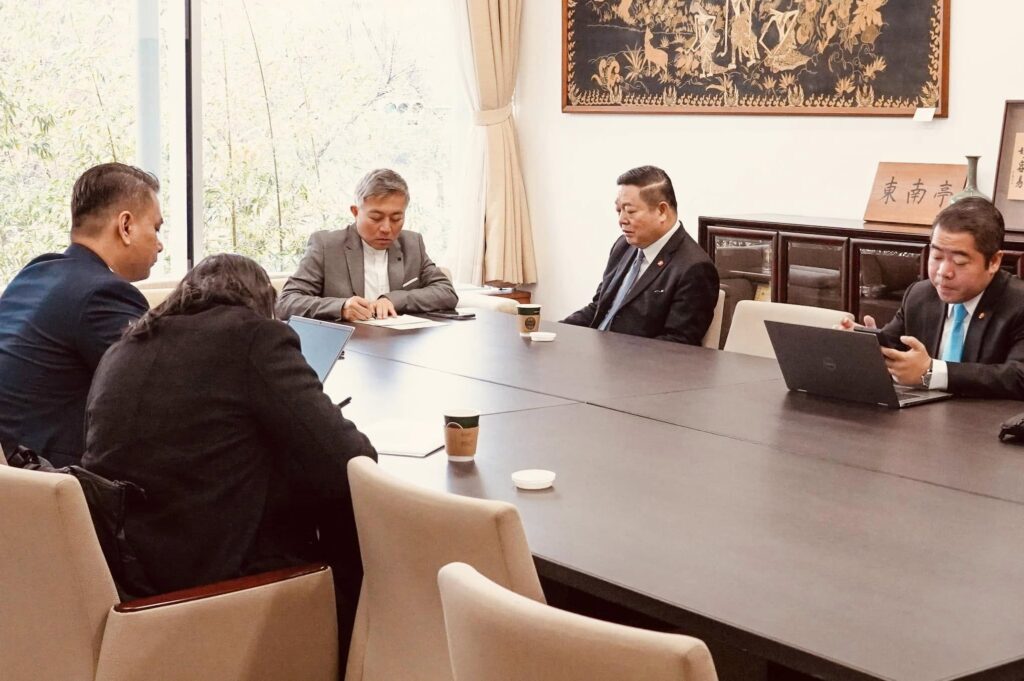
Dr. Kao: First, the United States is not a new but a longstanding partner of ASEAN. By 2027, we will be celebrating the 50th anniversary of our enduring partnership. It is clear that ASEAN has been able to enjoy bipartisan support from the United States. This is something that many people tend to overlook. I think what is important is that we have been working with the United States on many fronts and in different sectors and pillars. In 2022, we celebrated the 45th anniversary of ASEAN-US relations. At the same time, we elevated our relationship to the Comprehensive Strategic Partnership (CSP) level. There are a lot of areas of cooperation that we have done which is often overlooked. The United States is the number one source of FDI, and the second largest trading partner of ASEAN. Just look at these two areas, they are already very significant. With the new administration in Washington, we hope that the United States will continue to work very well with ASEAN.
Now, we are in the process of drafting a new ASEAN-US Plan of Action for 2026-2030 —our new five-year plan. We expected to have it completed for adoption by July next year. There is a lot of positive momentum. There is a bill — Partnership Act — in the US Congress now which has already been passed in the US House of Representatives. This bill, if approved by the US Senate, will provide a major, full recognition of ASEAN by the United States. We hope that the United States would recognize ASEAN as one of the key international organizations. We expect the United States to move forward on that.
We should not focus too much on what may become a self-fulfilling prophecy, but we need to focus on what we can do together in our partnership with the United States. We should continue to work with the United States in all mechanisms that we have between us, in trade and investment, among many others. For all areas of cooperation and mechanisms that we have with the US, we must continue to consolidate and strengthen them.
Dr. Kao: The ASEAN Secretariat is an institution that was set up by the ASEAN Member States. And this institution has evolved considerably over time. The ASEAN Secretariat did not have a lot of staff when it started. From the very humble beginnings, it has evolved over time. Today, the Secretariat is a full-fledged institution with human and financial resources, the talents to serve the interest of the Member States and, of course, also to work and support our external partners, our dialogue partners, sectoral dialogue partners, and our development partners. We receive support from our ASEAN Member States and from our external partners. We make sure that we are given the mandate on the work we do and the things that we pursue.
The institution has changed over time and a big change came in 1992, when the Secretary-General became not just the Secretary-General of the ASEAN Secretariat but the Secretary-General of ASEAN. Later on, with the ASEAN Charter, the role of both the ASEAN Secretariat and the Secretary-General of ASEAN were redefined and given much stronger mandate than ever before. Today, we have the Secretary-General who functions constantly. We have over 400 regular staff and more than 200 project staff. We have officials who think about ASEAN, who work on ASEAN, who promote ASEAN, who undertake various activities 24 hours —basically, every day and every year. They provide services to support the meetings, support the Chair, and support the ASEAN Member States. The Secretariat is in the process of further institutionalization to ensure that the decisions of the member states made will be monitored and carried out.
Meanwhile, the ASEAN Secretariat engaged with our external partners and is working to sustain our engagements. ASEAN Member States continue to invest in the ASEAN Secretariat by providing it with an annual operating budget. By making the annual contribution, member states have a lot of confidence and trust in this institution.
Certainly, we need to do more to make sure that we have a stronger and more effective role for the Secretariat because at the end the day, the ASEAN Secretariat serves the interests of the ASEAN Member States and the peoples of ASEAN. That is why I think we need to invest with resources and to enhance capacity and talents of the Secretariat.
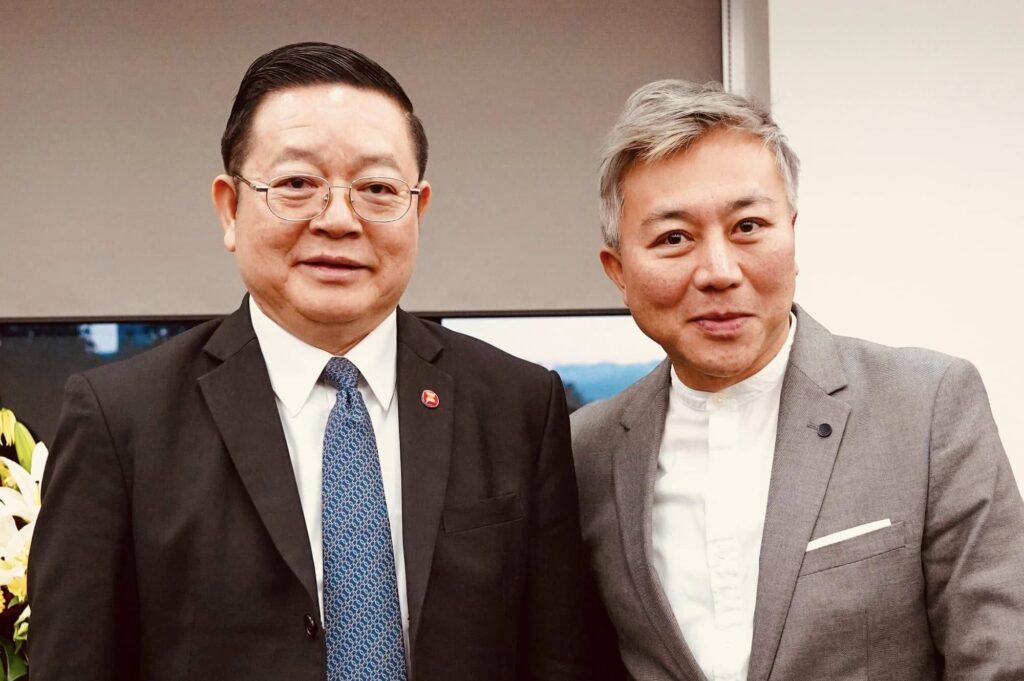
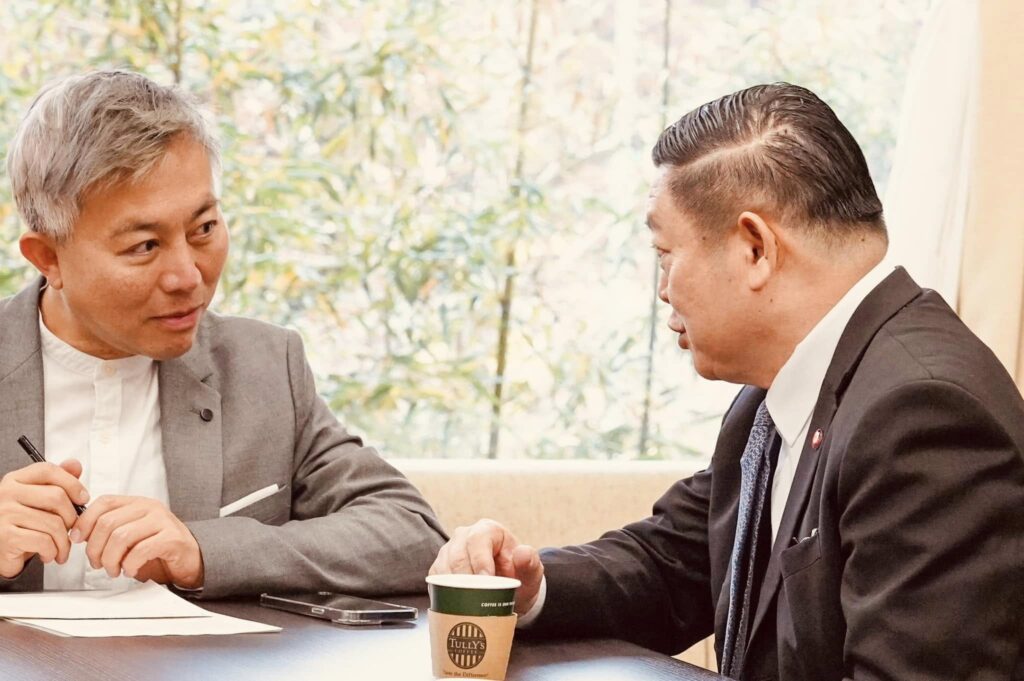
Biography of Dr. Kao Kim Hourn
Dr. Kao Kim Hourn’s career has focused on strengthening Cambodia’s international relations, particularly in ASEAN, driving policy advocacy and promoting research, education, and development. Dr. Kao had served as a two-term Minister Delegate attached to the Prime Minister of the Kingdom of Cambodia, from 2013 to 2022. He has authored dozens of books and articles on Cambodia and ASEAN.
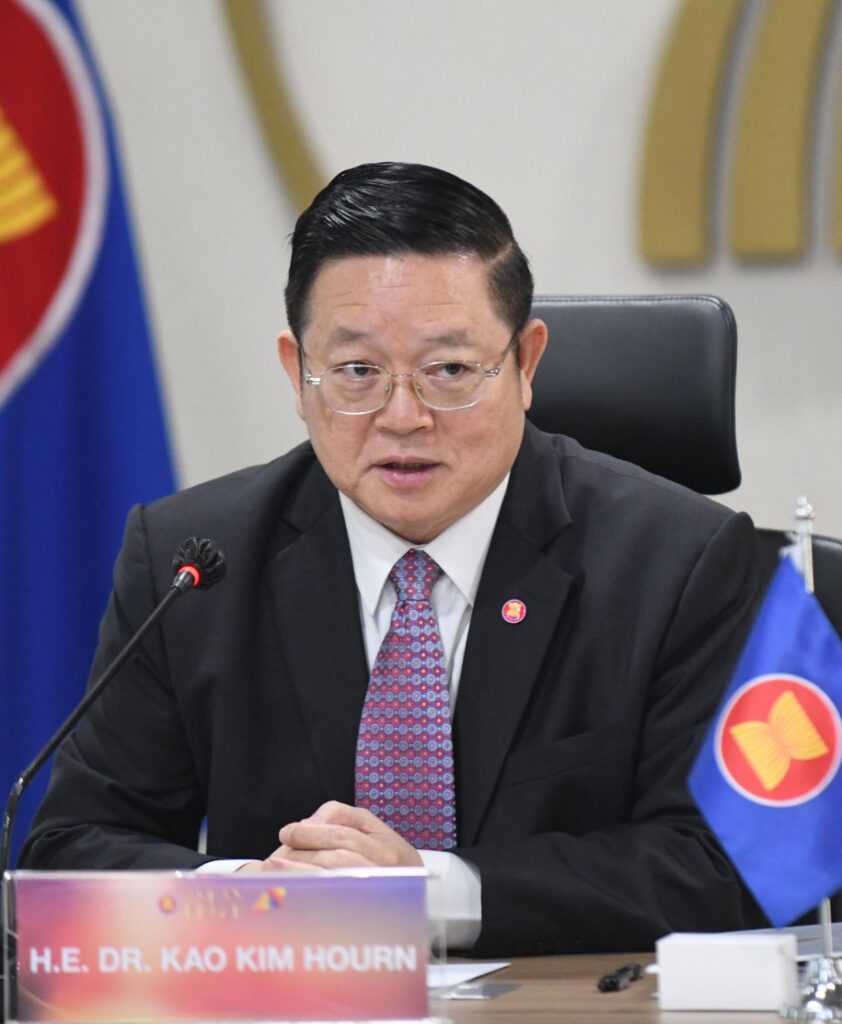
Dr. Kao is a Member of the Supreme National Economic Council, a Senior Fellow at the Jeffrey Cheah Institute on Southeast Asia, and a Member of the Global Council of The Asia Society. He serves as a Member of the Board of Directors for the Cambodian Institute for Cooperation and Peace and the Worldwide Support for Development.
With the mission of providing education to the disadvantaged Cambodian youths, Dr. Kao established The University of Cambodia in 2003 and continued to serve as the university president until he stepped down in October 2022.
For his services to Cambodia, Dr. Kao received the Royal Order of Cambodia, the Royal Order of Sowathara, and the Grand Order of National Merit, among others. He was also awarded an Honorary Doctor of Public Service from Ohio University in the United States, in 2007, and an Honorary Doctorate in Literature from the Kalinga Institute of Industrial Technology in India, in 2014. In addition, Dr. Kao received an Honorary Doctorate in Political Science from the Busan University of Foreign Studies, in the Republic of Korea, in June 2023, in recognition of his work and contribution to ASEAN. In recognition of Dr. Kao’s achievements in the field of political science and international affairs, he was conferred the Honorary Title of “Guest Professor” by Zhengzhou University, in Henan Province, the People’s Republic of China, on 15 October 2023. Dr. Kao Kim Hourn was conferred an Honourable Member of the International Advisory Board of the Institute of ASEAN Studies at the University of Oxford, United Kingdom, on 2 November 2023. Most recently, Dr. Kao was conferred the title of “Specially Invited Professor” by Hiroshima University, Japan, on 21 May 2024.
Dr. Kao started his career with the work in the think tank in Cambodia, dedicated to ASEAN and international affairs, after his return from his studies in the United States, in January 1993. He later joined the Royal Government of Cambodia where he had served, from August 2001 to August 2013, in a variety of capacities, including a post as Secretary of State of the Ministry of Foreign Affairs and International Cooperation, for two terms, from 2004 to 2013.
Dr. Kao completed Bachelor of Arts in Asian Studies from Baylor University, Master of Arts in Political Science and Master of Arts in International Studies from Ohio University, and Doctor of Philosophy in Political Science from the University of Hawaii at Manoa.
He is married with two adult children who live in Phnom Penh.
https://asean.org/what-we-do/secretary-general-of-asean/
Event flyer
